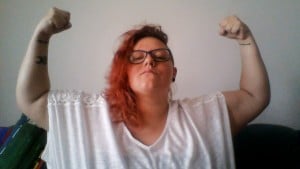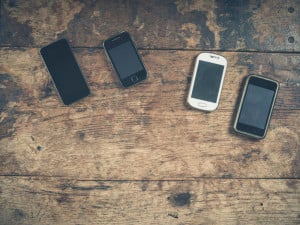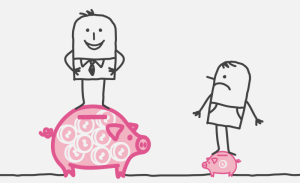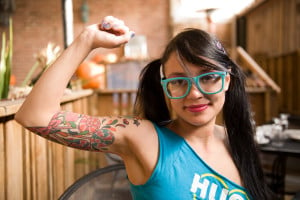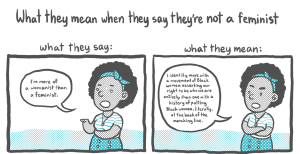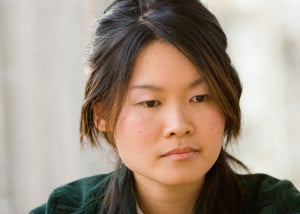Originally published on Role Reboot and cross-posted here with permission.
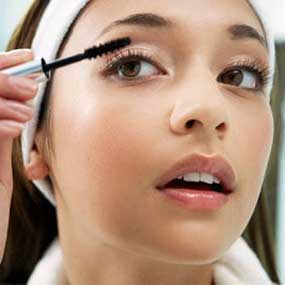
Credit: Our Beauty
Unless you truly find joy in wearing makeup, Emily Heist Moss says: to hell with all the truth-covering face paint.
Let me tell you some facts about my face. My eyelashes are not long enough. My cheeks are not pink enough. My lips are not shiny enough. My skin doesn’t subtly shimmer; it is not dewy, sun-kissed, or bronzed.
I know you have some of the same problems because you are a human woman and apparently we human women aren’t born with the features that human women are supposed to have. At least, that is what I’ve gleaned after 24 years as a media-consuming individual.
I was 8 the first time I remember feeling inadequate because of my lack of makeup know-how. It was a sticky summer day and my friend and I had exhausted ourselves in the heat and were desperate for a cool air-conditioned reprieve.
“Let’s play with makeup!” she said, grabbing her 4-year-old sister by the hand and making a bee-line for the bathroom. She propped the toddler on the sink and whipped out a bag of cheap, bright kiddie makeup, wide paintbrushes, and cute flowered compacts.
My friend painted one of her sister’s eyelids a clownish turquoise and handed me the brush, “Your turn.” I did my best, but the results were wavy and irregular, patchy and imperfect. I was out of my league.
Fast forward six years. It’s the first day of freshman year of high school. Entering the hallowed halls (sticky linoleum, fluorescent strip lights), I stopped in my tracks when I caught sight of my friend and her new look.
Black eyeliner rimmed her eyes, eyelashes twice their normal length, and eyebrows freshly tweezed. Who was this person and what was this memo I had missed?
Freshmen year was a chance for reinvention, that much I had surmised, but she was damn near unrecognizable. I was not prepared.
Last year, I ventured into a Sephora, a makeup and beauty products chain, with a makeup-savvy friend, determined to fill the gaps in my knowledge and finally, maybe, join the ranks of the women who know that primer is apparently not just for wall paint.
I perched on a stool while an impeccably put-together makeup artist quizzed me on my beauty routine. What foundation did I use? Toner? Bronzer? Under eye creams? I told her about my daily moisturizer (SPF 15!) and she laughed.
At 24, I was clearly a newbie, uninitiated into this $7 billion industry on which I was supposed to be an expert. I was embarrassed, so I left the store $80 poorer with a bunch of crap that sits in a basket on the top of my toilet and gets utilized maybe—maybe—once a month.
I’m told by those who love it that makeup can be fun. It can be a place for creativity and experimentation, a fertile ground for self-exploration and imagination.
Although I have never found refuge in the artful rearrangement of my features, as a kid who used to draw patterns on my fingernails with sharpies, I can understand the artistic urges, the satisfaction from a line that is just so.
What I can’t understand is the compulsory component of cosmetics, the suggestion that a woman is incomplete without her face “done,” that leaving the house mask-less is some sort of personal failure.
In Bridesmaids, Kristin Wiig sprints out of bed to apply her makeup before climbing back in with Jon Hamm, ensuring the dude she just slept with doesn’t see her as she really appears.
The joke only works because that urgency and fear resonates with actual women who actually worry about the world catching them with an uncurled eyelash or an uncovered-up pimple.
I don’t wear makeup to work, and I feel lucky to be employed in a place where that is acceptable. Many of my friends, however, work in places where professionalism, in behavior and appearance, is required.
And “professionalism,” for woman anyway, often implies makeup. Why is adding paint to your face to exaggerate your features part and parcel of “professional” expectations of women?
Some pieces of self-care, i.e. brushing your teeth and applying deodorant, are universally done for the benefit of your co-workers.
But for women, the expectations exceed basic hygiene. “Presentable” doesn’t just mean clean and neat (as it does for men), it means clean, neat, and polished up.
To see how obsessed we are with cosmetically removing “imperfections,” we need only look so far as your nearest tabloid. “Stars Without Makeup!” a headline will shout, bragging about catching a celebrity on a coffee run before she’s had time to hide herself behind a few layers of foundation. When Katy Perry’s makeup-less photo hit Twitter, her fans went bonkers.
When Secretary of State Hillary Clinton was “caught” on camera “au natural,” commenters debated whether she looked fresh and girlish or tired and haggard. She said to CNN, “I feel so relieved to be at the stage I’m at in my life right now. Because you know if I want to wear my glasses I’m wearing my glasses. If I want to wear my hair back I’m pulling my hair back. You know at some point it’s just not something that deserves a lot of time and attention. And if others want to worry about it, I let them do the worrying for a change.”
You hear that? She has other things to worry about, like world peace and diplomacy and national security! Whether you think she does a good job or not is irrelevant, we can all agree that her time is better spent on her work than on her eyelashes.
Women spend thousands of dollars on makeup (and that’s not even counting plastic surgery). We spend hours of our weeks putting it on, fixing it, and taking it off.
With that time we could be planning how to ask for a raise, spending time with our friends and family, reading a book, catching up on much-needed sleep, making a real breakfast, or taking a walk.
We can buy cars for the amount of money we spend on this stuff, take trips around the world, invest in our futures, pay off our debts, buy someone a nice gift.
Instead, we spend time and money fixing the pieces of our faces that we are told are not good enough.
We are not all Hillary Clinton. We are not all saving the world with the time we don’t spend applying eyeliner.
Some women (and men) derive tremendous joy from makeup, and to them I say, continue on your merry way. Does it make you happy? Does it leave you satisfied? Then fine, carry on.
But if your time in front of the mirror and dollars at the drug store are driven by fear that what you were born with is not enough, that if only your lashes were longer or your lips were pinker people would be better to you and good things would happen, that to be loved or respected or admired you need more layers and more colors, well, to hell with that.
You’re way too cool to waste your time on other people’s preposterous expectations.
Emily Heist Moss is a New Englander in love with Chicago, where she works in a tech start-up. She blogs every day about gender, media, politics and sex at Rosie Says, and has written for Jezebel, The Frisky, The Huffington Post and The Good Men Project. Find her on Facebook and Twitter.
Search our 3000+ articles!
Read our articles about:
Our online racial justice training
Used by hundreds of universities, non-profits, and businesses.
Click to learn more







